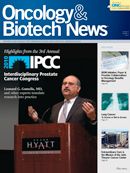Publication
Article
OBTN
FDA Approval Process Longer for Generics
Healthcare professionals and patients are facing a longer wait for the FDA to approve generic drugs than they were just 5 years ago--1 year longer, in fact. The delayed approval process is due to a growing backlog of applications at the FDA.
Healthcare professionals and patients are facing a longer wait for the FDA to approve generic drugs than they were just 5 years ago—1 year longer, in fact. The delayed approval process is due to a growing backlog of applications at the FDA.
At the recent annual meeting of the Generic Pharmaceutical Association, FDA commissioner Margaret A. Hamburg, MD, announced her intent to fix the problem. “It’s a real problem. I don’t pretend to believe that the status quo is acceptable.” She proposed a possible solution to speed up the process by charging application fees to the companies seeking approval for generic drugs, due to the deficiency in funds for the generic drugs department.
In 2005, the average time to FDA approval for generic drugs was 16.3 months from the filing of the application. Last year, however, that wait time had increased to 26.7 months, because of limited staffavailable to review a growing number of applications. The FDA has been so overwhelmed by the increasing number of generic applications that the backlog of pending applications is now at 2000—more than double the amount of pending applications in 2005. Gary J. Buehler, director of the FDA’s office of generic drugs, said that, starting in 2003, the agency began receiving nearly 800 applications annually, up from an average of 330 applications a year in the last decade.
Generic drug makers state that the underfunding of the FDA’s generics office is preventing patients from obtaining more affordable medicines. The fiscal year 2010 budget for the office of generic drugs is $51 million, which is up $10 million from fiscal year 2009. Last year, generics accounted for 70.4% of the 2.9 billion prescriptions in the United States, according to IMS Health. Generic prescriptions accounted for only 15% of the $300 billion spend on prescription drugs in the United States.
The delayed approval process hurts patients and government payers like Medicare—prices stay higher when no or only a few generic products exist. The generic industry supports a user-fee program as long as it is modeled after the program already in place for brand name drugs, in which fees are associated with timely review and action on applications. Buehler stated that the FDA is looking for ways to streamline the process, with an intent to eliminate the application backlog by 2012.
